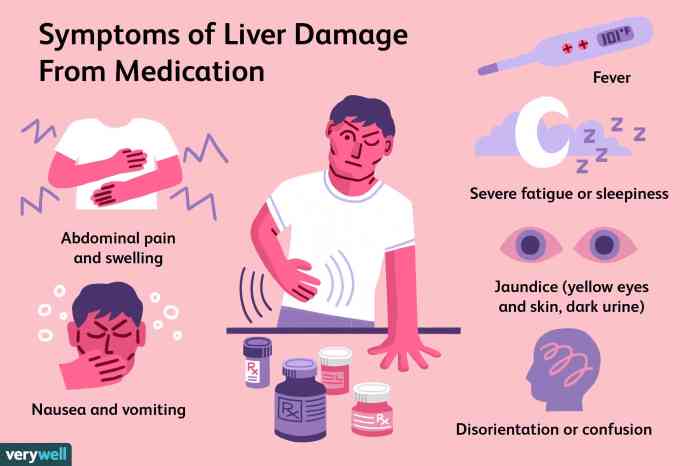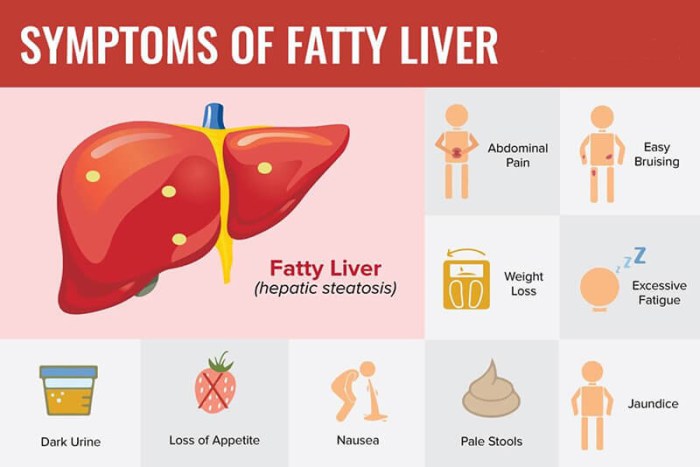
Liver disease symptoms are essential indicators that can alert us to underlying health issues. The liver, being a vital organ, plays a crucial role in digestion, detoxification, and metabolism. Recognizing the symptoms associated with liver problems can lead to early detection and management, significantly improving outcomes. This overview aims to unravel the complexity of liver disease symptoms, elucidating common signs and the differences between acute and chronic conditions.
From fatigue and jaundice to abdominal swelling and appetite changes, many symptoms may seem innocuous at first but can indicate serious health concerns. Our discussion will not only highlight these symptoms but also explore their impact on overall well-being and the connection between liver health and mental health, guiding readers towards proactive management strategies.
Liver Disease Symptoms Overview
Liver disease encompasses a range of conditions that affect the liver’s ability to function properly. Identifying the symptoms early can be crucial for effective management and treatment. Understanding these symptoms can help individuals recognize potential issues and seek medical advice promptly.Common symptoms associated with liver disease often include fatigue, jaundice, abdominal pain, and swelling in the legs. These symptoms can vary in severity and may indicate underlying liver dysfunction.
It is essential to understand the warning signs that may suggest liver problems and how they differ between acute and chronic liver disease.
Common Symptoms of Liver Disease
Liver disease can manifest through various symptoms, many of which are indicative of liver impairment. Recognizing these symptoms is vital for timely intervention.
- Fatigue: Persistent tiredness that doesn’t improve with rest can be a common symptom of liver problems.
- Jaundice: Yellowing of the skin and eyes occurs due to a buildup of bilirubin, a byproduct of the liver’s processing of red blood cells.
- Abdominal Pain: Discomfort or pain in the upper right abdomen may indicate liver inflammation or swelling.
- Swelling: Fluid retention in the legs or abdomen, known as edema or ascites, often signifies advanced liver disease.
- Dark Urine: Urine that is darker than usual can indicate liver dysfunction, particularly if accompanied by pale stools.
- Itchy Skin: Bile salt accumulation can lead to generalized itching, often more pronounced at night.
Warning Signs Indicating Liver Problems
Certain signs can serve as warnings that liver health may be compromised. Being attentive to these can facilitate early diagnosis and treatment.
- Unexplained Weight Loss: Sudden weight loss without a clear cause can indicate severe liver disease.
- Loss of Appetite: A significant decrease in appetite can be a symptom of liver dysfunction.
- Confusion or Forgetfulness: Hepatic encephalopathy may result from the liver’s inability to remove toxins from the blood, leading to cognitive issues.
- Easy Bruising or Bleeding: A compromised liver can affect blood clotting, resulting in easier bruising or prolonged bleeding.
Differences Between Acute and Chronic Liver Disease Symptoms
Understanding the distinction between acute and chronic liver disease is essential, as symptoms may vary significantly between the two. Acute liver disease often presents suddenly, while chronic liver disease symptoms may develop gradually over time.
Acute liver disease can present with rapid onset of symptoms, whereas chronic liver disease symptoms may be subtle and progressive.
- Acute Symptoms: Symptoms such as severe abdominal pain, confusion, and jaundice can appear suddenly and require immediate medical attention.
- Chronic Symptoms: Symptoms may include long-term fatigue, ongoing jaundice, and gradual metabolic changes, often evolving over months or years.
Impact on Overall Health
Liver disease can significantly affect a person’s overall health and well-being, leading to a wide array of physical and mental health challenges. The liver plays a crucial role in many bodily functions, including detoxification, metabolism, and the production of essential proteins. When liver disease symptoms manifest, they can create a ripple effect that impacts multiple aspects of health, making it vital to understand these connections.One of the primary ways liver disease symptoms influence overall health is through their effect on metabolic processes.
A compromised liver can lead to the accumulation of toxins in the body, resulting in fatigue, weakness, and a general decline in physical health. Furthermore, impaired liver function can disrupt the body’s ability to properly digest and absorb nutrients, leading to malnutrition and a host of related complications.
Connection Between Liver Health and Mental Health Conditions
The link between liver health and mental health is becoming increasingly recognized, with studies showing that individuals with liver disease are at a higher risk of experiencing mental health conditions such as depression and anxiety. The stress of managing a chronic illness can exacerbate these mental health issues, creating a challenging cycle for patients.
Chronic Fatigue and Mental Health
Fatigue caused by liver dysfunction can lead to feelings of hopelessness and sadness, which are common in depression.
Toxic Accumulation
The build-up of toxins due to liver impairment can affect neurotransmitter function, possibly leading to mood disorders.
Social Isolation
Symptoms like jaundice or ascites (fluid accumulation) can alter an individual’s appearance or mobility, leading to social withdrawal and loneliness.
Cognitive Function
Liver disease can lead to hepatic encephalopathy, a condition that affects cognition and mental clarity, further contributing to mental health issues.
Nutritional Needs and Dietary Restrictions
The dietary needs of individuals with liver disease can differ significantly from those of the general population. A well-balanced diet is crucial for managing symptoms and supporting liver health, but certain foods may need to be restricted to prevent further damage.It’s important to consider the following dietary factors for individuals with liver disease:
Protein Intake
While protein is essential for healing, excessive intake can produce ammonia, which the liver may struggle to process. It’s crucial to balance protein sources, opting for high-quality proteins like fish and lean poultry.
Sodium Reduction
Sodium can contribute to fluid retention and swelling in individuals with liver disease, necessitating a low-sodium diet to help manage symptoms effectively.
Hydration
Proper hydration supports liver function and overall health. However, fluid intake may need to be monitored in cases of ascites or other complications.
Vitamin and Mineral Supplementation
Individuals with liver disease often experience deficiencies in various vitamins and minerals, such as vitamin D, B vitamins, and zinc, due to impaired absorption or increased metabolic demands. Supplementation may be necessary based on a healthcare provider’s recommendations.
“Maintaining a balanced diet is integral for individuals with liver disease to manage symptoms effectively and support overall health.”
Prevention and Management Strategies

Addressing liver disease symptoms effectively requires a multifaceted approach, combining lifestyle changes, alternative treatments, and proactive healthcare practices. By focusing on prevention and management strategies, individuals can significantly enhance their well-being and minimize the impact of liver disease on their lives.Liver disease can manifest in various forms, and managing its symptoms is crucial for maintaining overall health. A comprehensive guide to lifestyle modifications can empower those affected by liver disease to navigate their condition with informed choices.
These lifestyle changes may include dietary adjustments, regular physical activity, and effective stress management techniques that contribute to liver health.
Lifestyle Changes for Managing Liver Disease Symptoms
Implementing specific lifestyle changes plays a pivotal role in alleviating liver disease symptoms. These changes enhance liver function and overall health. Important lifestyle adjustments include:
- Healthy Diet: A balanced diet rich in fruits, vegetables, whole grains, and lean proteins supports liver health. Foods high in antioxidants, like berries and leafy greens, may reduce inflammation.
- Avoiding Alcohol: Reducing or eliminating alcohol consumption can prevent further liver damage and support recovery.
- Regular Exercise: Engaging in regular physical activity helps maintain a healthy weight, lowers the risk of fatty liver disease, and improves overall liver function.
- Hydration: Drinking adequate water is vital for flushing toxins from the body and supporting liver metabolism.
- Weight Management: Achieving and maintaining a healthy weight can decrease the risk of liver complications, particularly in individuals with non-alcoholic fatty liver disease (NAFLD).
Alternative Treatments for Alleviating Symptoms
Various alternative treatments can also provide relief from liver disease symptoms, supporting the body’s natural healing processes. These methods often complement conventional medical approaches and may include:
- Herbal Supplements: Milk thistle is commonly used to support liver health due to its antioxidant properties. It may help protect liver cells from damage.
- Acupuncture: This traditional Chinese therapy can alleviate symptoms such as pain and nausea associated with liver disease by promoting energy flow in the body.
- Mind-Body Techniques: Practices such as yoga and meditation can help manage stress, which is beneficial for overall liver health.
- Probiotics: These beneficial bacteria can support gut health and may reduce liver inflammation and improve liver function.
Healthcare Practices for Early Detection and Intervention
Early detection and intervention are critical in managing liver disease effectively. Regular healthcare practices can facilitate timely diagnosis and treatment. Key practices include:
- Routine Health Screenings: Regular check-ups and liver function tests can help identify potential issues early, allowing for prompt intervention.
- Monitoring Symptoms: Being vigilant about any changes in health, such as fatigue, jaundice, or abdominal discomfort, can prompt early medical evaluation.
- Vaccinations: Staying up to date with vaccinations for hepatitis A and B can prevent viral infections that lead to liver disease.
- Consultation with Specialists: Regular visits to a hepatologist or gastroenterologist can ensure specialized care for liver-related concerns.
Concluding Remarks

In conclusion, understanding liver disease symptoms is crucial for maintaining overall health. By being aware of these signs and their implications, individuals can make informed decisions about their health and lifestyle. Early detection through regular check-ups and lifestyle modifications can significantly enhance the quality of life for those at risk or suffering from liver issues. Remember, taking care of your liver is taking care of your entire body.
FAQ Overview
What are the early signs of liver disease?
Early signs include fatigue, nausea, loss of appetite, and unexplained weight loss.
Can liver disease cause mental health issues?
Yes, liver disease can significantly impact mental health, leading to conditions like depression and anxiety.
How can I support my liver health?
Maintaining a balanced diet, staying hydrated, limiting alcohol intake, and exercising regularly can support liver health.
Are there any specific dietary restrictions for liver disease?
Yes, individuals may need to limit salt intake, avoid raw or undercooked seafood, and reduce saturated fats.
How is liver disease diagnosed?
Liver disease can be diagnosed through blood tests, imaging studies, and sometimes liver biopsy.





